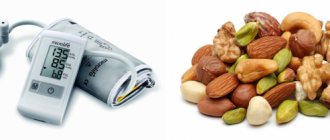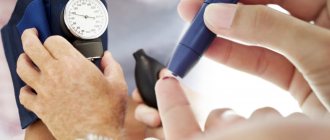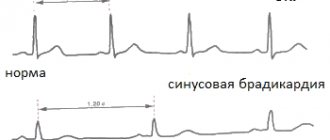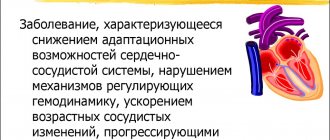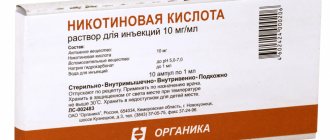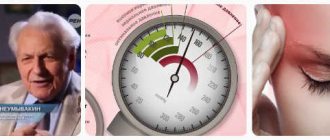Hypertension is a symptom of significantly increased blood pressure. Bradycardia is a symptom in which the heart rate decreases to sixty beats per minute. The combination of the two is rare because with high blood pressure, the heart is more likely to speed up to supply oxygen to the entire body rather than slow down. Therefore, it is difficult to choose drugs for hypertension and bradycardia - most drugs, on the contrary, slow down the heart rate in people with hypertension.
The mechanism of bradycardia in hypertension
The human heart is a complex system that is controlled by the sinoatrial node. This is where signals coming from the brain are interpreted, and problems with it lead to bradycardia. The signals are not read correctly and the heart beats slower. The reasons for this are different.
Depending on them, bradycardia can be:
- Medicinal - occurs after taking glycosides, antiarrhythmic drugs, beta-blockers and many other drugs;
- neurogenic - caused by a contraction of the nervous system, causing peptic ulcers, depression, neurosis, obsessive-compulsive states or hypertension;
- endogenous - formed as a result of an increase in the amount of oxygen, calcium or potassium in the blood;
- toxic - occurs as a result of infection, such as influenza, sepsis, typhoid fever;
- cardiogenic - develops as a symptom of cardiovascular diseases such as coronary heart disease or cardiosclerosis;
- senile - develops as a result of deterioration of the heart apparatus.
There is also an idiopathic form - it develops in addition to hypertension for unclear reasons.
Factors contributing to the development of bradycardia and arterial hypertension are similar:
- elderly age;
- abuse of bad habits;
- physical inactivity;
- bad eating habits, stress, lack of sleep or too much sleep.
Due to the rarity of this combination, it is difficult to treat.
Treatment methods
Treatment of bradycardia in hypertension is carried out by selecting specific medications; if necessary, the patient is recommended to undergo surgical intervention. Medicines should help to gently increase the heart rate, but also keep blood pressure levels under control.
Drug treatment
Bradycardia that occurs at high blood pressure cannot be treated independently. Inappropriate use of medications can provoke an additional increase in tonometer readings simultaneously with the pulse, which will cause an acute hypertensive crisis. Usually, to correct the condition, doctors select medications from the group of alpha-blockers.
They act on the receptors of cells responsible for exciting the nervous system and transmitting impulses to the brain.
Also, alpha-blockers gently increase the heart rate without causing an increase in blood pressure. Most often, patients are prescribed the drugs Doxazosin, Terazosin, Prazosin. In addition to this group of medications, experts prescribe ACE inhibitors - these are Captopril, Fosinopril, Lisinopril, Enalapril. They increase heart rate, but have a less pronounced effect than alpha-blockers.
At the same time, diuretics, analgesics to eliminate spasms and pain, and angiotensin receptor blockers may be recommended. Beta-blockers and calcium antagonists are prohibited for this disease.
How dangerous are these two diseases?
First of all, the general well-being of a person simultaneously suffers from the presence of high blood pressure and bradycardia. He becomes irritable, cognitive functions suffer, and he has difficulty concentrating. Headache. Shortness of breath appears - first during activity, then at rest.
To make matters worse, complications begin to develop over time:
- heart disease - hypertension and bradycardia develop, for example, heart failure;
- nervous system disorders - endogenous depression, cerebral hemorrhages;
- eye disease that can lead to complete blindness;
- diabetes, which seriously impairs quality of life;
- Morgagni-Adams-Stokes syndrome - affects brain cells, the patient may experience sudden attacks of seizures, accompanied by convulsions, which can lead to death;
- Sudden cardiac arrest syndrome is a classic complication of bradycardia that occurs because the body cannot function normally with a heart rate below forty beats per minute.
And, of course, complications include heart attack and stroke, which are often fatal.
Decreased heart rate during a hypertensive crisis
Doctors do not note high blood pressure during bradycardia so often, so treatment of this condition requires a special approach. How does the heart rate become abnormal during an exacerbation of arterial hypertension? Against the background of increased blood output, the heart actively contracts, causing blood pressure to rise.
The volume of circulating blood increases significantly; such symptoms are characteristic of heart failure. Vascular resistance increases, causing them to spasm - this deviation is noted during coronary artery disease. However, bradycardia cannot occur in this scenario, from which doctors conclude that the two conditions are not interrelated. They exist in parallel, further aggravating the patient’s condition with hypertension.
In a critical situation, when the pulse has noticeably decreased during a hypertensive crisis, you need to call a team of doctors. This especially applies to the category of patients whose vision suddenly becomes dark, numbness of the limbs, shortness of breath and dizziness appear. The danger of this condition is the possible occurrence of fainting and seizures.
To relieve shortness of breath, you can give the patient an Eufillin tablet; to reduce blood pressure, you can give a drug approved by the doctor (if it does not affect low pulse rates). You should also ensure air flow into the room by opening the windows. It is better not to place the patient horizontally, but to invite him to take a semi-sitting position
He needs to be calmed down; you can give him a couple of Valerian tablets under the tongue. Tea with lemon balm or mint has a sedative effect. If the patient’s condition is serious, it is better not to delay calling a medical team. Excessive bradycardia during a hypertensive crisis can cause death.
Characteristic symptoms and signs
The patient's diagnosis of a combination of bradycardia and arterial hypertension can be identified by symptoms. This includes:
- chronic fatigue - constant craving for sleep;
- dizziness - intermittent, usually due to physical exertion;
- general weakness - it is difficult for the patient to concentrate, it is difficult to perform actions that previously did not cause problems in a healthy state;
- shortness of breath - initially occurs only during physical activity, progresses over time and even occurs at rest.
Occasionally, the patient experiences attacks that are accompanied by an increase in blood pressure along with bradycardia. The pulse slows down and breathing becomes difficult. Sharp stabbing pain in the left side of the chest may spread to the arm.
She may be confused and may not respond if asked how she is doing.
A blood pressure diary, which is recommended for everyone over the age of 50, can also be used to track disease combinations. If measurements show that your blood pressure is constantly or frequently elevated, consult your doctor.
Diagnostic methods
To make a diagnosis, the doctor must perform several diagnostic procedures:
- Obtain a medical history. The patient should be asked about symptoms, whether he has previously had high blood pressure, whether there are any concomitant diseases or allergies.
- Exam. The doctor listens and taps on the chest - if a person is sick, the sound will be different from normal.
- Echocardiogram and ultrasound. Allows you to get a complete picture of the condition of the heart.
- Cardiogram. Allows you to find out how the heart works, whether there are any malfunctions. It is there that the presence of bradycardia in a patient can be detected.
- Angiography. This allows you to find out the condition of the blood vessels.
In addition, if the doctor sees such a need, he can put a device on the patient that will monitor heart rate and blood pressure throughout the day. Test results will help make a diagnosis.
Diagnosis of bradycardia
When diagnosing bradycardia, use:
- physical diagnostic methods (examination, palpation, percussion, auscultation)
- electrocardiographic examination
- 24-hour ECG monitoring
- Ultrasound of the heart
- load bicycle ergometry
- transesophageal electrophysiological study of cardiac conduction tracts. Using this examination, it is possible to determine whether bradycardia is organic or functional in nature.
Another way to detect arrhythmia is to measure pressure using an electronic tonometer. Modern electronic tonometers, as well as Microlife tonometers, have a pulse measurement sensor.
Advantages of treating bradycardia in hypertension with medications
Many older people are afraid to take blood pressure pills. They all seem to be made up of terrible chemicals and have devastating side effects on the body. In fact, it is almost impossible to treat hypertension with bradycardia without medications.
They have several positive effects:
- Inotropic effect - under the influence of the drug, the heart begins to contract more strongly, and thus the effect of bradycardia is reduced;
- chronotropic effect - as a result of taking drugs, the heart begins to beat faster
- dromotropic effect - provides a higher speed of impulse that travels through the nervous system from the brain to the heart and signals the need for contraction
- butotropic effect - increases the sensitivity of the heart to nerve impulses.
There are also additional effects. For example, strengthening blood vessels or increasing oxygen levels in the blood. Although a different lifestyle can achieve a lot, pills are necessary.
List of tablets for high blood pressure: names and properties
If you have high blood pressure and bradycardia, you shouldn't take all the medications—only those that won't slow your heartbeat.
- Alpha adrenergic blockers. These drugs are universal because they do not slow down the heart rate, but increase it. They reduce the tone of peripheral vessels, reduce the load on the heart muscle and reduce the heart's need for oxygen, which leads to a gradual decrease in blood pressure. Their active ingredients are different. The most common are prazosin (found in Polpressin), doxazosin (found in Zoxon, Artesin) and Terazosin (found in Hytrin).
- ACE inhibitors. An increase in the amount of an enzyme in the blood that replaces another enzyme that increases blood pressure. They do not affect heart rate. Examples are enalapril, lisinopril, quinapril, ramipril, perindopril.
In addition, the treatment regimen includes diuretics, which remove excess water from the body and thereby reduce blood pressure. Among them, loop groups (furosemide), thiazide and thiazide (hypothiazide) and potassium-sparing (spironolactone) groups are used.
Also - Atropine, a drug recommended for seizures. At home it is taken in tablets, in the hospital - intravenously. The dose is always the same - five milligrams.
If the attack resulted in loss of consciousness—which can happen if the heart rate drops below forty beats per minute—the patient called an ambulance and received emergency treatment:
- Position them so that their head is above their feet;
- unbutton tight clothes, open the window in the room;
- turn the patient's head to the side so that he does not choke on vomiting if it occurs.
If the pulse stops before the ambulance arrives, chest compressions may need to be started. All drugs should be selected only with a doctor - the treatment regimen for patients with arterial hypertension is complex and depends on concomitant diseases, allergies, age and personal preferences. Self-prescription and dosing mean an unnecessary risk to your health.
General recommendations for bradycardia and high blood pressure
Usually, a slow heartbeat is observed with a decrease in blood pressure - hypotension, but many hypertensive patients also note dangerous symptoms of heart rhythm disturbances. A deviation, when the main organ of the human body with elevated tonometer readings (from 140/90 mm Hg) begins to beat slower than 60 times per minute, is provoked by many reasons.
General recommendations on how to treat bradycardia with high blood pressure depend specifically on the provoking factors:
- Taking too high a dosage of drugs from the group of beta blockers, which were prescribed to a hypertensive patient by a doctor to get rid of arterial hypertension, causes bradycardia. You may need to adjust dosages or stop taking certain medications after consulting your doctor.
- Suppression of the sinus node due to the use of drugs with a high content of calcium and potassium - while the pulse rate noticeably decreases. After assessing the existing changes, drug doses should be adjusted and symptomatic therapy should be carried out.
- The painful condition that occurs when hypertension passes into a chronic advanced stage must be prevented. To do this, hypertensive patients should undergo regular examinations, especially if a low pulse is regularly recorded during periods when the pressure has increased.
- Timely cure heart diseases - ischemia and cardiomyopathy, diagnose congenital defects.
- Pay attention to and treat pathologies of other systems and internal organs that affect high blood pressure during bradycardia. Inadequate production of thyroid hormones, kidney and liver failure, diabetes mellitus - all these diseases increase the risk of underestimating the heart rate in hypertensive patients.
- Timely identify the abnormal structure of the capillary system, which manifests itself at the genetic level.
- Prevent, if possible, age-related changes in blood vessels, during which they lose their elasticity, become fragile and lead to exacerbation of existing diseases.
A decrease in the heart rate is often observed after a severe course of viral infections; this condition is perceived as a complication of the disease. In addition, low pulse, which accompanies high blood pressure, is observed in people who abuse alcohol and smoke. Therefore, it is necessary to increase immunity to prevent severe colds and give up bad habits.
Frequent stress, lack of sleep, chronic fatigue, and a tendency to depression contribute to the aggravation of the condition.
Problems with the cardiovascular system are most difficult for people with obese body mass. Here, high blood pressure, accompanied by a slowdown in heart rate, is aggravated by swelling, breathing problems, constant rushes of blood to the face and neck, and increased sweating.
How to increase heart rate with normal blood pressure?
Hypertensive patients who lead a sedentary lifestyle, do not follow a diet, and abuse salty, spicy and smoked foods are almost all prone to pathological changes in the functioning of the heart.
Based on the above, if the pulse decreases against the background of high blood pressure, the factors provoking this syndrome should be eliminated. First of all, limit stressful and conflict situations. It is necessary to provide the body with proper rest, sleep at least 8 hours a day.
For chronic fatigue and problems with sleep, a vacation is necessary; if necessary, the doctor can prescribe sedative medications, preferably of herbal origin. What diet is necessary for a hypertensive patient who regularly has a low pulse? You definitely need to give up table salt or limit its amount.
You also need to forget about baked goods, carbonated drinks, fast carbohydrates, fatty, smoked and spicy foods. The ideal option is to eat lean meat and steamed fish, vegetables, fruits, grains and fiber. If necessary, the specialist prescribes a course of vitamin therapy.
Preventive methods to combat the disease
And, of course, we should not forget that no treatment for bradycardia and high blood pressure will help if we do not change our lifestyle. These changes should be comprehensive and start with the daily routine:
- Sleep at least eight hours a day, this time should be at night - at night, in the dark, the body recovers best;
- You need to go to bed and get up at the same time so that the body can get used to it;
- The daily routine should include a half-hour or even longer walk, which can be taken at a leisurely pace in the nearest park;
- The daily routine should include time for quiet rest without any irritants - sit in a chair for ten minutes with your eyes closed and not think about anything.
You must give up bad habits. Alcohol worsens high blood pressure because it worsens blood vessels and retains water in the body. Tobacco also negatively affects blood vessels and helps reduce the overall immunity of the body.
Don't forget about food - the diet should be simple and healthy. To do this you need:
- Eliminate foods containing a lot of animal fat - full-fat milk, butter, cottage cheese, fatty parts of red meat;
- exclude fast food - they contain harmful additives, are too high in calories and generally have a negative effect on health;
- Reduce the consumption of fried, fatty, smoked, salty, spicy foods - you don’t need to give up your favorite foods, but you need to control their consumption, otherwise hypertension will clearly progress;
- Increase your consumption of white meat and vegetables - they can be eaten boiled, stewed, baked, or even fried in a little oil;
- increase the consumption of low-fat dairy products - you can drink kefir or milk, eat cottage cheese or yogurt, eat processed and hard cheeses;
- Try to eat a variety of low-fat foods whenever possible.
Recommendations for lifestyle changes associated with this disease can also be used to prevent serious cardiovascular diseases, not just bradycardia associated with hypertension.
Causes of bradycardia
The extracardiac form of bradycardia (bradycardia associated with disorders not related to heart disease) can develop with:
- neurocirculatory dystonia
- neuroses with autonomic dysfunction
- pressure on the carotid sinus (the sinus that is located in the neck)
- pressing on the eyeballs
- increased intracranial pressure (with meningitis, brain contusion, subarachnoid hemorrhage, brain edema or tumor)
- peptic ulcer of the stomach and duodenum.
Causes of the organic form of bradycardia (associated with heart disease):
- myocardial infarction
- myocardial dystrophy
- myocarditis
- cardiosclerosis.
The toxic form of bradycardia develops under the following conditions:
- sepsis
- hepatitis
- uremia
- typhoid fever
- organophosphate poisoning
- slowing down the processes of automaticity and conduction in the heart muscle (hypercalcemia or severe hyperkalemia)

